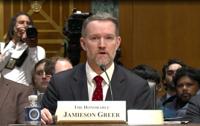(The Center Square) – Senators grilled U.S. Trade Representative Jamieson Greer in a Tuesday hearing on the rash of tariffs imposed by President Donald Trump, raising concerns that the administration’s trade policies will hurt Americans and small businesses.
Some Republicans offered a more hopeful take on the tariffs, including Senate Finance Committee Chair Mike Crapo, R-Idaho, arguing that the long-term effects of the tariffs will outweigh the painful, short-term effects, such as a tumbling stock market and layoffs nationally.
“Members and the public have questions and concerns about the recent tariff actions. That’s OK. We should think about tariff impacts and ask questions,” Crapo said. “[But] it is important to contextualize the tariffs in the design of the larger policy.”
But other lawmakers called Trump’s tariff spree “aimless” and “chaotic,” with Sen. Ron Wyden, D-Ore., saying the tariffs have turned the U.S. economy “from the envy of the world to a laughingstock.”
“Through it all, Donald Trump and his advisors have yet to provide any understandable explanation at all for what his tax hike on the American people is supposed to accomplish,” Wyden said. “And so, this morning I would like to focus on one central question – what is the plan?”
Supporters of Trump’s policies argue the reciprocal tariffs will bring back domestic manufacturing, raise revenue for the federal government and reduce the $1.2 trillion trade deficit racked up under the previous administration.
Greer told lawmakers that over the past 30 years, the U.S. is experiencing “an economic and national security emergency” caused primarily by unfair trade conditions. The crisis hits working class Americans the hardest, Greer added, noting how since 1994, the U.S. has lost 5 million manufacturing jobs and 90,000 factories.
“It will not be resolved overnight, but all of this is in the right direction,” Greer said. “We must move away from an economy that’s based solely on government spending and a financial sector, and we must become an economy based on producing real goods and services that provide jobs for working class and middle-class Americans and their communities.”
Dozens of countries, including Argentina, Vietnam, India, and Israel, have already expressed willingness to lower their tariffs in response to Trump’s actions, Greer said, with many leaders approaching him personally over the past few days.
But Wyden pointed to China’s swift retaliation and how it could raise costs for Americans, arguing it doesn’t seem Trump has “any strategy at all.” Greer said for now, the administration would focus on other, less recalcitrant trade partners.
Senators from both sides of the aisle, while acknowledging the potential future upsides of the tariffs, pressed Greer on how small American businesses are supposed to cope.
“I think you’ve missed a huge hole in the problem that these tariffs have created,” Sen. Sheldon Whitehouse, D-R.I., said to Greer. “If all you’re listening to is the big mega corporations who can move things around the world and have the resources to dodge these effects, you’re not getting the straight story.”
Sen. Ron Johnson, R-Wis., who recently called Trump’s tariffs a “bold but risky action,” echoed Whitehouse’s concerns, telling Greer “I hope you and the president are sensitive to companies potentially going bankrupt by these actions.”
Greer acknowledged the difficulties but maintained a positive outlook.
“This adjustment may be challenging at times,” Greer said. “And in a moment of drastic, overdue change, I’m certain that the American people can rise to the challenge as they’ve done before.”











